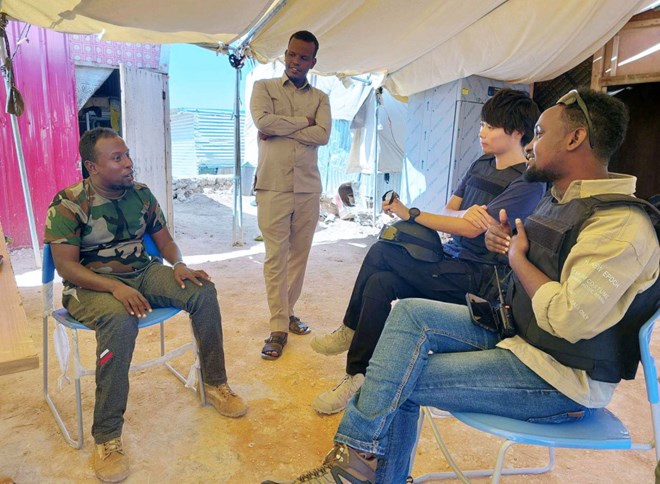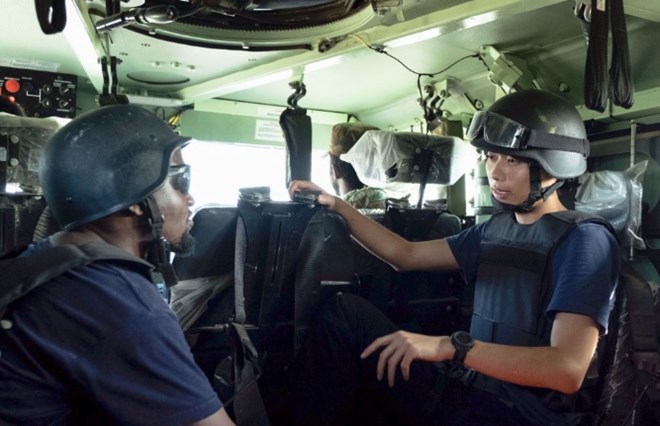
Tuesday April 25, 2023

Undated photo shows Yosuke Nagai (2nd from R) attending a regular meeting with commanders of the Somali government forces in Somalia. (Photo courtesy of Accept International)(Kyodo)
Nagai, 31, is the representative director of Japanese nonprofit Accept International and has spent the last decade in war-torn countries such as Somalia in Africa and Yemen in the Middle East, helping young men leave terrorist groups.
"My sense of duty to fulfill my mission wins out (over the fear of death)," he says, having released a book in Japanese in February about his ambition to "break the chains of hatred" between people in armed conflict zones around the world.
In Somalia, Nagai often travels to prearranged rendezvous points in armored vehicles to meet men seeking refuge, having usually fled from war zones.
Sometimes Nagai must wear a bulletproof vest, and he always carries emergency medical supplies with him, such as a hemostatic agent used to stop wounds from bleeding.
"The risk (of dying) is never zero. The fatality rate in my job is by far the highest in the nonprofit sector," he says.
The task is a daily routine for Tokyo-based Accept, which operates primarily in Somalia, Yemen, Kenya and Indonesia. In Somalia and Yemen, armed clashes and terrorist attacks involving Islamic extremist groups are frequent. "It is the worst place in the world to do anything," says Nagai.
Born and raised in Kanagawa Prefecture, near Tokyo, Nagai, who went through a rough patch early in life, became interested in environmental issues during high school, gradually leading to his desire to become an activist.
During a summer visit to Kenya in his freshman year of college, he was appalled by the sight of refugees arriving from neighboring Somalia after the country experienced a famine.

Undated photo shows Yosuke Nagai (R) traveling in an armored vehicle in Somalia. (Photo courtesy of Accept International)(Kyodo)
After returning to Japan, Nagai consulted with experts and looked at ways he could help people get out of extreme poverty, but was told that his involvement would only cause trouble.
Eventually, with the goal of "just helping out," he launched a student group which eventually led to the creation of Accept International.
Nagai's goal of reducing deaths in Somalia was eventually put into action by identifying two key ways of addressing the country's high mortality rate: eliminating terrorism and preventing armed conflict.
Accept operates a "surrender hotline," offering refuge to those seeking to escape terrorist organizations with the aim of weakening the support base of such groups. When contacted, Nagai will go wherever he is needed, even if that means rushing to the frontline of a conflict with the help of a military escort.
If an intelligence agency determines the person brought into custody is not a high-risk individual, Nagai will work with them at a facility and provide them with vocational training to reintegrate them into society. Accept is tasked with running one of four such facilities operating in Somalia.
Those leaving the terrorist organizations are sometimes former child soldiers who were prevented from accessing basic education. Such individuals are provided with Islam re-education programs to assist in their deradicalization, alongside equipping them with key skills such as reading and writing.
Receiving threats from terrorist organizations by telephone and on social media is a daily occurrence, says Nagai. He has lost many friends along the way and has no illusions about the danger involved in his line of work. "I think it is likely I will die out here somewhere," he suggests, yet he maintains that the fear of death does not deter him.
"What do we need to do to improve society? We should not only do what we can, but also think about how we can actively solve problems," he says.
In his book, Nagai not only describes the dangerous aspects of his work but also the moments that give him a deep sense of satisfaction and reward, such as the time he spends with local staff and former terrorists who have turned their lives around.
"I think I have only really become a true professional in the past couple of years," Nagai says, but his actions speak louder than his words, with his activities drawing the attention of the United Nations.
Despite his modesty, his willingness to take on the huge responsibility of deradicalizing young men in some of the world's most dangerous places indicates he is up to the task.